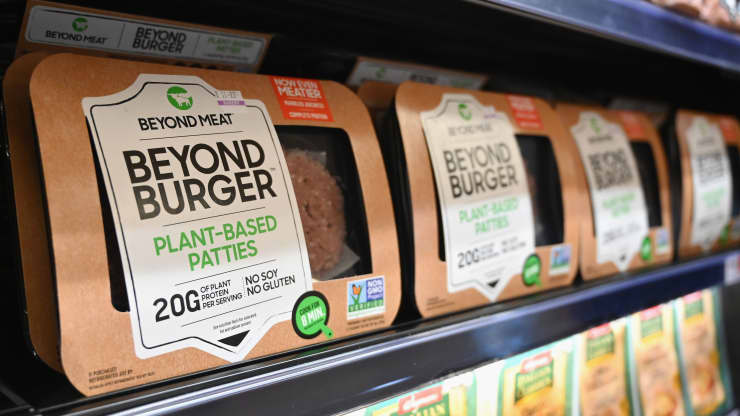Kaplan Fox & Kilsheimer LLP, a law firm, is reminding investors about a filed complaint on behalf of purchasers of Beyond Meat, Inc. common stock during the period between May 5, 2020, and October 13, 2022 (the “Class Period”).
The complaint alleges that Beyond Meat made false and misleading statements about its ability to produce plant-based meats at scale. It claims that the company faced challenges in manufacturing its meat substitutes, leading to production delays, misaligned decision-making, and difficulties meeting partner specifications.
The truth allegedly began to emerge when Beyond Meat reduced its third-quarter net revenue outlook and announced rising expenses and inventories. The stock price declined following these disclosures and further news reports highlighting the company’s scaling problems and canceled partnerships.
The departure of top executives in October 2022 also resulted in a decline in the stock price. Investors who suffered losses during the Class Period have the opportunity to become lead plaintiffs by filing a motion with the court before July 10, 2023.
Beyond Meat liquidates stock in retail stores to boost sales
Videos posted by shoppers on social media indicate that Beyond Meat products are now available at Dollar Tree stores at a significantly discounted price. Shoppers have reported finding packs of Beyond Burger patties and Beyond’s Breakfast Sausage patties selling for $1.25, much lower than the prices at other retailers.
It is unclear whether this availability is a limited-time test or a long-term distribution strategy. Beyond Meat’s goal has always been to reach price parity with animal meat products, but achieving this has been challenging.
The company experienced a decline in sales after an initial surge in demand during the early stages of the pandemic. To boost sales, Beyond Meat has been experimenting with lower prices at select retailers, and early results suggest that lower prices lead to increased consumer purchases.
The company’s latest earnings report showed a 9.8% decline in revenue in 2022, and they are scheduled to report first-quarter earnings soon.
The plant-based meat industry as a whole has faced slower demand due to factors such as high prices, taste preferences, and questions about health benefits compared to traditional meat.
Is this the end of the plant based burger industry?
UK meat brand Heck recently announced its plan to reduce its vegan-friendly range from 15 products to just two. The company stated that shoppers were not yet interested in buying vegan products. Several news outlets speculated that this decision might indicate a decline in interest in vegan meat. However, let’s examine the evidence to see if this claim holds true.
According to a forecast report by Straits Research, the UK vegan food market is actually experiencing significant growth, with a predicted compound annual growth rate of 9.1 percent between 2023 and 2031. The report highlights that the meat substitute segment is a major contributor to the plant-based market, driven by high demand in developed economies like the US and UK.
The UK meat substitutes market is currently valued at around USD $1 billion, and Sainsbury’s, one of the largest UK retailers, predicts that a quarter of the UK population will be meat-free by 2025. Therefore, it seems that there is a positive outlook for vegan products in the UK.
It’s worth noting that Heck is not the only company struggling in the competitive alternative meat market. Beyond Meat, another major player, experienced a decrease in net revenues and a decline in stock prices in 2022, leading them to seek additional funding. However, attributing the decline in sales solely to the end of the vegan sector is a simplistic and unsubstantiated approach. The market dynamics are complex, and there are multiple factors to consider.
Beyond Meat faced controversy when its chief operating officer was arrested and subsequently left the company. Public perception of Beyond Meat was negatively impacted, and there have been ongoing concerns about the nutritional value and processing methods of their products. Additionally, Beyond Meat’s products are not always cost-effective compared to other options in the freezer.
The cost of living crisis is also a significant factor. In a challenging financial climate, consumers seek value for their money. If customers are not satisfied with a product like Heck’s meat-free items, they are likely to look for cheaper alternatives. In such circumstances, it is crucial for companies to consider both competition and pricing to attract and retain customers.
It is essential to listen to the market and conduct thorough analysis before entering a new market solely based on news coverage. A careful examination of market size and proportional product range would have been a smarter approach for Heck. It is possible that inaccurate analytics or media hype led to misunderstandings about the vegan market, resulting in bad press.
The expansion of low-cost, plant-based product lines in supermarkets and the growing trend of homemade meals during the pandemic have also increased competition. Moreover, people’s motivations for switching to vegan products vary, with concerns about animal cruelty, health, and the environment playing a significant role. Many consumers prefer fully vegan brands with clear sustainability plans over meat processors that also offer plant-based options.
Veganism is more than just a diet; it is a lifestyle choice driven by ethical, environmental, and health values. Consumers now have higher expectations for vegan products, and companies must meet those expectations to remain competitive. Heck’s decision to remove its vegan products from supermarket shelves indicates a failure to meet these expectations in terms of quality and sustainability.















